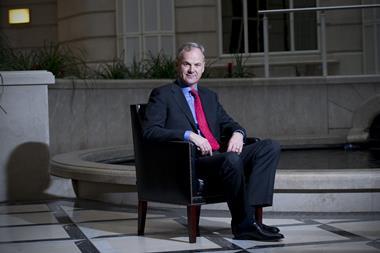StrategicRISK’s European Risk Manager of the Year 2012 John Ludlow, of InterContinental Hotels, developed his risk management system while rescuing the Toby carvery chain. And it stood him in good stead through the unrest in Egypt during the Arab Spring
Thousands of protesters are milling outside the hotel, threatening to burst through the doors. The army has sent in tanks. Bombs are going off in the distance. And the guests and staff are, naturally enough, in a state somewhere between concern and terror. None of them can get in or out.
Extreme as this scenario may seem, it’s exactly what InterContinental Hotels’ head of risk management, John Ludlow, faced when the Egyptian people overthrew the dictatorship of president Mubarak in the Arab Spring of February 2011 and the InterContinental Semiramis in Cairo was effectively under siege.
Welcome to another day in the life of an executive responsible for the security, in the broadest possible sense, of a global hotel chain. “When people see something bad happening on the news, it almost always affects one of our hotels and we’re already on the phone,” says Ludlow’s colleague and director of corporate risk management Danny Wong.
Thus last year alone, among other events, InterContinental Hotels Group (IHG) guests and staff were caught up in floods in Queensland, earthquakes in Christchurch and Fukushima’s
tidal wave.
Ready for anything
On top of natural disasters and civil unrest, IHG’s crisis team have to be ready for just about anything. “The risks faced by our hotels are many and varied,” says Ludlow. “They range from strategic risks to operational risks such as fire, food hygiene, and health and safety, to issues arising from terrorism and organised crime. Providing our guests and visitors with an environment in which they feel safe and secure is essential.”
Unlikely as it seems, Ludlow has developed a global system of dealing with these multiple risks from the methods he used to revive a restaurant chain in Britain between 1996 and 1998. “Our risk management system grew out of multi-unit management and branded outlets,” says 48-year-old Ludlow, a veteran of the hospitality industry who cut his teeth as a regional manager for a number of branded hotel and restaurant chains (see CV).
Appointed general manager of the then 120-restaurant, Bass Taverns-owned Toby chain, Ludlow found it “tired, confused and unprofitable”. The rescue plan was built around lower prices and a carvery format but, to make it work, Ludlow’s small team established four principles prioritised in order of importance: relevance, consistency, distinctiveness and repeatability. In fairly short order Toby made an impressive recovery, with average meals served per outlet more than quadrupling to 3,000 a week and profits rising more or less in tandem.
“This is what you’ve got to achieve right across a multi-unit estate like IHG,” says Ludlow. In fact, multi-unit estate hardly covers it. IHG has 4,600 hotels, spread over nearly 100 countries (and growing by the week), plus something like 350,000 staff and 153 million guests a year. Accordingly, Ludlow has a $100m budget.
A far-flung firm
Appointed to the top risk management job in 2007, Ludlow applied the lessons learned at Toby to develop a web-based toolkit that is deployed right across the hotel chain’s vast estate. (An ‘asset-light’ company, IHG only owns a handful of properties – the rest are managed or franchised.) The purpose is to provide a cost-effective way of enhancing and protecting InterContinental Hotels’ brand in multiple cultures. He calls this brand-hearted risk management.
An estate-wide internal audit function keeps on top of things. Split into three core areas, it focuses on hotel control, corporate and regional functions, technology and systems.
You can’t just tell people this is what you want them to do because they won’t listen. You must first satisfy their needs’
John Ludlow
Spreading the gospel throughout such a far-flung firm sounds as challenging as implementing the risk culture itself. “It’s not the number of countries or the number of languages, but the diversity of cultures [that makes the job difficult],” Ludlow says.
To sell the risk message in societies with vastly differing values, he ensures local risk managers repackage it accordingly. “You have to think about how you are going to implement the strategy,” says Ludlow. “You can’t just tell people this is what you want them to do because they won’t listen. You must first satisfy their needs.” Thus in New York the message is dressed up around higher financial rewards, in Asia around the long-term benefit to the family, in the Middle East around security, principally fire safety and terrorism.
But the underlying message is always the same and, because of the multiplicity of languages (up to 38 in some hotels), the main web-based tool is internationalised, with plenty of pictures and cartoons to help embed the system.
Crisis management template
And when things get sticky, the company-wide crisis management system provides a kind of template for staff and guests that keeps them focused. “The crisis plans facilitate structured team working at a time when there is considerable uncertainty and behaviours are under pressure from the stresses that you get at such events,” Ludlow adds.

The system certainly worked in Cairo, with a bit of outside help. As the turbulence outside the Semiramis threatened to spill over into the building with possibly life-threatening consequences, Ludlow parachuted in what he calls “thinkers”, experts who could add extra expertise to the standard check-list. The two troubleshooters were a military intelligence officer to secure the perimeter, and a health and safety professional to help manage the situation inside the hotel.
Result? After a few fraught days, everybody got out safely with total damage amounting to one broken window.
Properly handled, IHG’s risk management system can add value to the brand even in the throes of a crisis. During the floods in Queensland that put whole city suburbs under water during 2010 and 2011, the staff in the state capital of Brisbane dusted off ‘Shelter in the storm’, a template developed for just such an event.
With all normal business suspended, IHG staff were deployed to help out other stricken residents. The staff’s family came first, then the community and, once its own properties were secured, IHG lent a helping hand to other hotels.
In the hotel industry, effective risk management falls straight to the bottom line. In the last few years IHG’s multi-unit brand management has produced a steady fall in the average number and cost of insurance claims per room and, as a result, lower premiums. “Our level of risk across the estate is now more attractive to insurers,” says Ludlow.
Tangible benefit
And in a brand dependent on business travellers, the effective management of events such as those during the Arab Spring is reassuring for companies and their travel intermediaries. The benefit to IHG is tangible, coming in the shape of a bigger share of these companies’ travel budgets and, word of mouth being the cheapest and most effective form of advertising, nice comments in tripadvisor.co.uk from guests who have been guided through insurrections and natural disasters.
But the next event is never quite the same as the one before and, as IHG pushes deeper into China, Russia and other relatively new markets, there’s no doubt that the system developed for Toby is due for many a modification in the light of experience.
CV
1986-94
Area manager for Boddingtons, Whitbread and Allied Domecq
1994-98
General manager of Toby Restaurants, part of Bass Taverns
2003- Vice-president of operations development for Europe for InterContinental Hotels Group. Became vice-president of risk management for emerging markets in 2003; appointed head of risk management early 2007
Five big risks
Hotels face more than their fair share of risks to people, property and the business. InterContinental Hotels head of corporate risk Danny Wong says there are five major dangers:
- Safety and security
Because hotels are located where people want to go, any event in a city or town presents instant problems: “in almost every catastrophe we’ll have a hotel there somewhere”. - Information security
Organised criminals are increasingly hiring hackers to crack guests’ credit cards and steal corporate information, while terrorist groups are looking for vulnerabilities in IT systems to enable cyber attacks. - Online travel agent
By selling hotel stays in non-branded packages and undercutting prices, Expedia and the other online booking services threaten to undermine the very business model of branded groups that invest in their name plate. “They’re commoditising the brand,” says Wong. - A dearth of qualified staff in fast-growing markets
Countries such as China, Russia and several in Latin America suffer from a chronic shortage of high-quality hotel managers. The problem becomes particularly frustrating as hotel chains plan to open properties in secondary and tertiary cities across regions. InterContinental aims to hire 70,000 people in China alone over the next three years but has yet to establish where it will find them. - Capital constraints
A shortage of development capital is slowing down the roll-out of hotels in the USA, UK and Europe, where many are funded by real estate investment trusts. This hurts hotel chains because their share price may be influenced by their development pipeline. On the plus side, it means they can raise room rates in existing properties.




















No comments yet